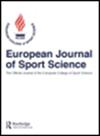运动心理学中的心理模型:初步探讨
IF 3
3区 医学
Q2 SPORT SCIENCES
引用次数: 6
摘要
应用心理学以多种理论模型为特征,为服务提供的分类、解释和干预提供了不同的方法。这些理论或心理模型包括行为、生物、认知、人文、心理动力学和社会范式,接触这些模型和态度形成发生在以大学为基础的体育心理学发展阶段。因此,对于运动心理学领域来说,调查发展中的态度是很重要的,因为这些模型为随后的专业实践和决策提供了信息。为此,本研究通过修改后的Maudsley态度问卷(男34人,M年龄= 24.71岁,SD = 7.23)和女42人,M年龄= 24.76岁,SD = 6.20)对第一阶段运动心理学学生的态度进行了调查。该问卷旨在评估八种心理模型(如生物、认知)和四种运动心理问题(表演前焦虑、缺乏自信、抑郁和饮食失调)的态度。方差分析显示了显著的主效应、模型效应和交互效应。没有一种心理模型得到所有受访者的认可,模型的认可随着所提出问题的不同而显著变化。主轴分解揭示了认知-行为和“折衷”(混合社会建构主义、生物学和心理动力学元素)模型的巨大贡献。相比之下,精神模式代表了低水平的参与者认可和应用。对第一阶段学生的调查可以促进对当前发展态度的循证理解,并为运动心理教育的发展、训练路线的监督和随后的专业交付提供信息。本文章由计算机程序翻译,如有差异,请以英文原文为准。
Psychological models in sport psychology: A preliminary investigation
Abstract Applied psychology is characterised by a variety of theoretical models, informing distinct approaches to classification, explanation, and intervention in service-delivery. Such theoretical or psychological models include behavioural, biological, cognitive, humanistic, psychodynamic, and social paradigms, with exposure to these models and attitude formation occurring within the structured university-based stage of sport psychology development. It is, therefore, important for the sport psychological domain to investigate developing attitudes, given these models inform subsequent professional practice and decision making. Accordingly, the present study explored the attitudes of Stage-1 sport psychology students through a modified form of the Maudsley Attitude Questionnaire (34 males, M age = 24.71 years, SD = 7.23 and 42 females, M age = 24.76 years, SD = 6.20). The questionnaire was designed to assess attitudes across eight psychological models (e.g. biological, cognitive) and four sport psychology issues (pre-performance anxiety, a lack of confidence, depression, and eating disorders). Analyses of variance demonstrated significant main, model, and interaction effects. No one psychological model was endorsed by all respondents, with model endorsement varying significantly as a function of the issue presented. Principal Axis Factoring revealed a large contribution attributable to cognitive–behavioural and ‘eclectic’ (mixed elements of social constructionism, biological, and psychodynamic) models. In contrast, the spiritual model represented low levels of participant endorsement and application. Investigation of Stage-1 students can promote an evidence-based understanding on currently developing attitudes and inform the development of sport psychology education, supervision of training routes, and subsequent professional delivery.
求助全文
通过发布文献求助,成功后即可免费获取论文全文。
去求助
来源期刊
CiteScore
6.60
自引率
3.10%
发文量
153
审稿时长
6-12 weeks
期刊介绍:
The European Journal of Sport Science (EJSS) is the official Medline- and Thomson Reuters-listed journal of the European College of Sport Science. The editorial policy of the Journal pursues the multi-disciplinary aims of the College: to promote the highest standards of scientific study and scholarship in respect of the following fields: (a) Applied Sport Sciences; (b) Biomechanics and Motor Control; c) Physiology and Nutrition; (d) Psychology, Social Sciences and Humanities and (e) Sports and Exercise Medicine and Health.

 求助内容:
求助内容: 应助结果提醒方式:
应助结果提醒方式:


